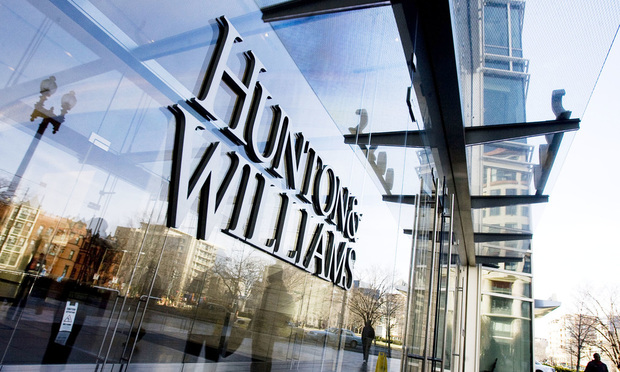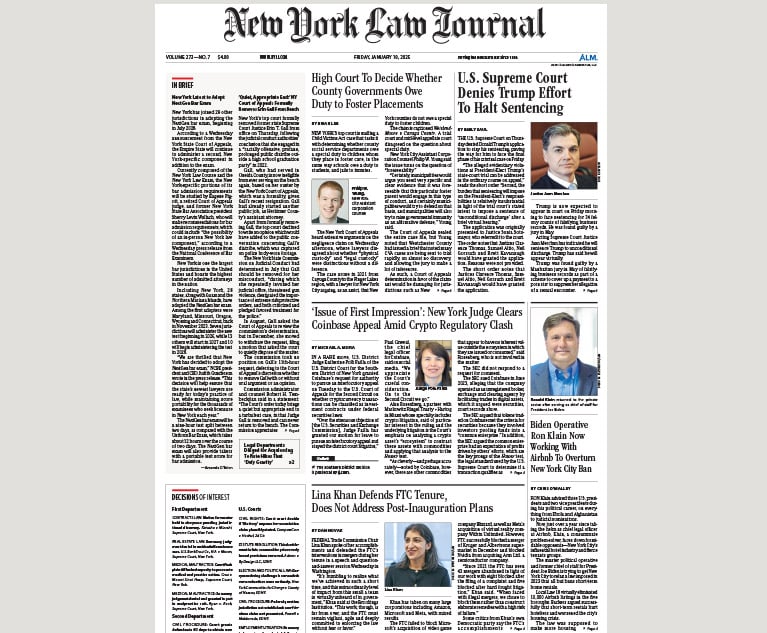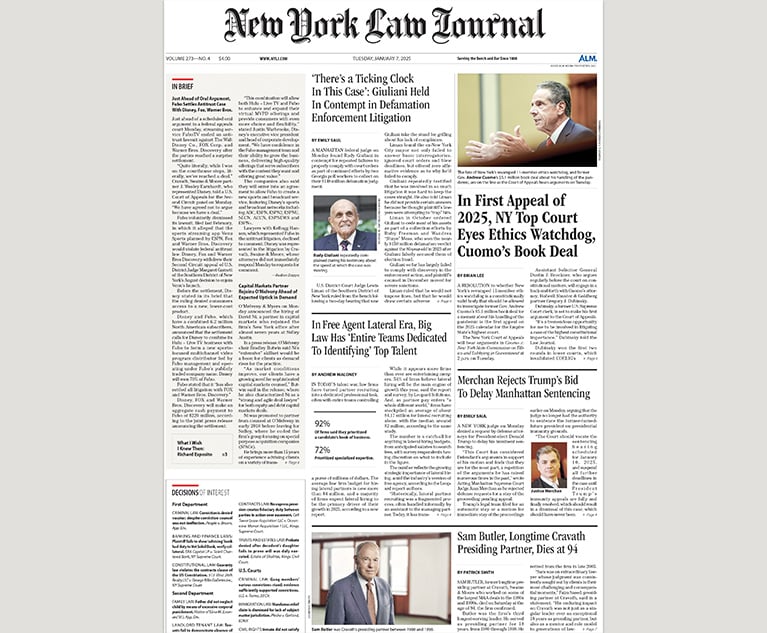Hunton Beats Oil Company Financier's $124 Million Malpractice Suit
A New York judge said part of the suit boiled down to “dissatisfaction with ... strategic choices” made by the law firm.
April 09, 2019 at 05:19 PM
3 minute read
 Photo: Diego M. Radzinschi/ALM
Photo: Diego M. Radzinschi/ALM
A predecessor firm of Hunton Andrews Kurth has beaten a legal malpractice suit brought by an oil company financing firm that sought more than $124 million,
The suit against Hunton & Williams was brought by Bison Capital Corp., which blamed bad lawyering for a poor result in Bison's contractual dispute with a Texas oil and gas company.
In an April 5 decision, Manhattan Supreme Court Justice Saliann Scarpulla said part of the suit boiled down to “dissatisfaction with … strategic choices” made by the law firm. Scarpulla concluded the firm had valid reasons to make the decisions that Bison had questioned and said the former client's suit could not go forward.
In its malpractice suit, which was filed in 2015, Bison alleged that Hunton failed to introduce key evidence in its federal lawsuit against ATP Oil & Gas, which was saved from bankruptcy in 2004 after Bison helped it forge a relationship with a major investment bank that supplied critical financing in the following years.
Bison hired Hunton to sue ATP, saying it was entitled to somewhere from $86 million to more than $120 million in fees, but Bison won barely $2 million at trial—an amount it failed to collect after ATP filed for bankruptcy.
Bison alleged Hunton committed malpractice and failed to honor its contractual commitment to have a key partner conduct important depositions.
However, Scarpulla said Hunton's decisions in the ATP litigation were defensible and said there was no way to calculate any damages that might have been avoided if the partner, Marty Steinberg, had conducted the depositions.
“Bison's contention that had [Steinberg] conducted the depositions and meaningfully participated in the trial preparations, Bison would have won the damages it sought in the underlying action, is pure speculation,” the judge wrote.
Hunton & Williams merged with Andrews Kurth in 2018 to form Hunton Andrews Kurth.
The decision follows a 2016 ruling from Scarpulla that dismissed most of the suit but allowed Bison to try again. Even then, she said most of Bison's allegations of malpractice were “plainly disagreements with Hunton & Williams' professional decisions.” She described Hunton at several points in last week's decision as “reasonable and prudent.”
Legal tactics that Bison sued over included Hunton's alleged failure to introduce Securities and Exchange Commission reports on ATP as evidence. But Scarpulla noted that the trial judge in the ATP case said such a move would be a “waste of time.”
Bison also alleged Hunton failed to put a junk bond financing expert on the stand to explain what was meant by “value” in Bison's agreement with ATP and Hunton did not immediately execute on the $2 million judgment.
Still, Scarpulla found that each of those moves was defensible and none of them clearly cut against Bison. She cut the final claim—for violations of the New York Rules of Professional Conduct—because private litigants cannot sue for alleged violations of the state ethics code, the judge said.
Richard Trotter, an associate at Tannenbaum Helpern Syracuse & Hirschtritt who represented Bison, and Caitlin Shadek, counsel at Sherman Wells Sylvester & Stamelman who represented Hunton & Williams, didn't respond to request for comment.
This content has been archived. It is available through our partners, LexisNexis® and Bloomberg Law.
To view this content, please continue to their sites.
Not a Lexis Subscriber?
Subscribe Now
Not a Bloomberg Law Subscriber?
Subscribe Now
NOT FOR REPRINT
© 2025 ALM Global, LLC, All Rights Reserved. Request academic re-use from www.copyright.com. All other uses, submit a request to [email protected]. For more information visit Asset & Logo Licensing.
You Might Like
View All
Sullivan & Cromwell Signals 5-Day RTO Expectation as Law Firms Remain Split on Optimal Attendance
Trending Stories
Who Got The Work
Michael G. Bongiorno, Andrew Scott Dulberg and Elizabeth E. Driscoll from Wilmer Cutler Pickering Hale and Dorr have stepped in to represent Symbotic Inc., an A.I.-enabled technology platform that focuses on increasing supply chain efficiency, and other defendants in a pending shareholder derivative lawsuit. The case, filed Oct. 2 in Massachusetts District Court by the Brown Law Firm on behalf of Stephen Austen, accuses certain officers and directors of misleading investors in regard to Symbotic's potential for margin growth by failing to disclose that the company was not equipped to timely deploy its systems or manage expenses through project delays. The case, assigned to U.S. District Judge Nathaniel M. Gorton, is 1:24-cv-12522, Austen v. Cohen et al.
Who Got The Work
Edmund Polubinski and Marie Killmond of Davis Polk & Wardwell have entered appearances for data platform software development company MongoDB and other defendants in a pending shareholder derivative lawsuit. The action, filed Oct. 7 in New York Southern District Court by the Brown Law Firm, accuses the company's directors and/or officers of falsely expressing confidence in the company’s restructuring of its sales incentive plan and downplaying the severity of decreases in its upfront commitments. The case is 1:24-cv-07594, Roy v. Ittycheria et al.
Who Got The Work
Amy O. Bruchs and Kurt F. Ellison of Michael Best & Friedrich have entered appearances for Epic Systems Corp. in a pending employment discrimination lawsuit. The suit was filed Sept. 7 in Wisconsin Western District Court by Levine Eisberner LLC and Siri & Glimstad on behalf of a project manager who claims that he was wrongfully terminated after applying for a religious exemption to the defendant's COVID-19 vaccine mandate. The case, assigned to U.S. Magistrate Judge Anita Marie Boor, is 3:24-cv-00630, Secker, Nathan v. Epic Systems Corporation.
Who Got The Work
David X. Sullivan, Thomas J. Finn and Gregory A. Hall from McCarter & English have entered appearances for Sunrun Installation Services in a pending civil rights lawsuit. The complaint was filed Sept. 4 in Connecticut District Court by attorney Robert M. Berke on behalf of former employee George Edward Steins, who was arrested and charged with employing an unregistered home improvement salesperson. The complaint alleges that had Sunrun informed the Connecticut Department of Consumer Protection that the plaintiff's employment had ended in 2017 and that he no longer held Sunrun's home improvement contractor license, he would not have been hit with charges, which were dismissed in May 2024. The case, assigned to U.S. District Judge Jeffrey A. Meyer, is 3:24-cv-01423, Steins v. Sunrun, Inc. et al.
Who Got The Work
Greenberg Traurig shareholder Joshua L. Raskin has entered an appearance for boohoo.com UK Ltd. in a pending patent infringement lawsuit. The suit, filed Sept. 3 in Texas Eastern District Court by Rozier Hardt McDonough on behalf of Alto Dynamics, asserts five patents related to an online shopping platform. The case, assigned to U.S. District Judge Rodney Gilstrap, is 2:24-cv-00719, Alto Dynamics, LLC v. boohoo.com UK Limited.
Featured Firms
Law Offices of Gary Martin Hays & Associates, P.C.
(470) 294-1674
Law Offices of Mark E. Salomone
(857) 444-6468
Smith & Hassler
(713) 739-1250









